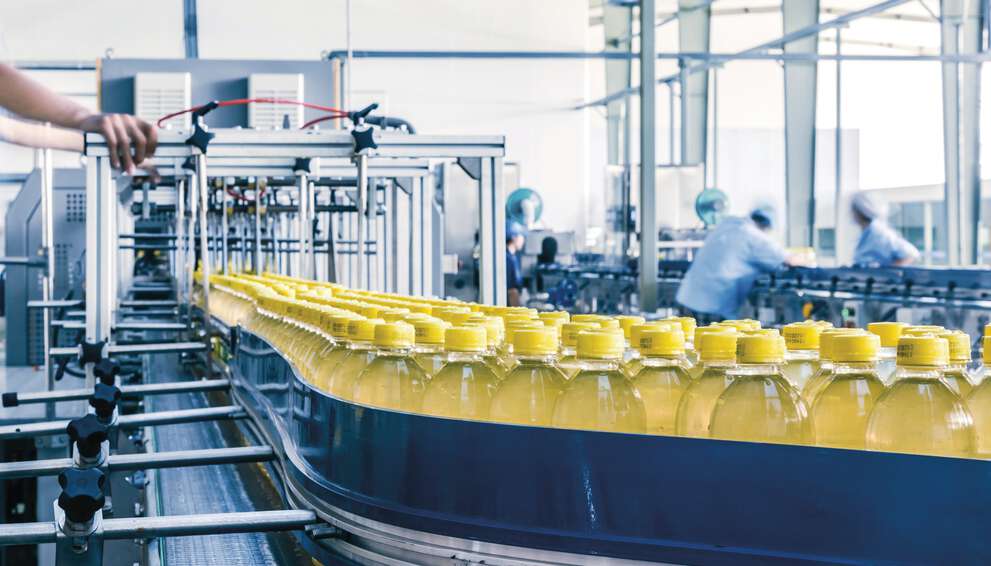Microchannel heat exchangers for food and beverage production

The food industry requires precise temperature control at every stage, from storing ingredients to cooling the final product. Microchannel heat exchangers (MCHE) are becoming increasingly in demand in these applications due to their high efficiency, compact design and hygienic advantages over traditional heat exchange technologies.
Problems of temperature control in the food industry
Food and beverage manufacturers face unique demands for temperature control:
- Strict temperature control ensures product safety and quality.
- Conditions with high humidity that affect the durability of the equipment.
- Corrosion-resistant materials are required for frequent flushing.
- Increased energy efficiency is required to reduce operating costs.
- Limited space in industrial premises.
Microchannel technology effectively solves these problems, increasing system performance.
Advantages of microchannel heat exchange devices for the food industry.
Excellent hygiene indicators
The all-aluminum construction from MCHEs ensures:
- Absence of copper components that can cause corrosion and contamination
- Smooth surfaces, resistant to bacterial growth
- Compatibility with aggressive cleaning agents
Increased energy efficiency
Microchannel designs provide:
The heat transfer is 10-30% better than that of conventional coils
Lower pressure drops in the air
Reduced energy consumption of the pump/fan
Compact design
Compact dimensions provide:
- reduction of dimensions by 30-50% compared to tubular-ribbed coils
- Flexible installation options in cramped conditions
- Lower weight for easier installation
Reliable operation in wet conditions
The corrosion resistance of aluminum prevents:
- Deterioration of performance due to moisture
- Premature failure under flushing conditions
- Contamination due to corrosion of materials
Main applications in the food and beverage industry
1. Ingredient cooling systems
Fast cooling of dairy products, oils and liquid ingredients
Precise temperature control of sensitive components
Cooling of process fluids by means of coils with cooled water
2. Pasteurization of products
Efficient heat recovery systems
Precise temperature maintenance
Compact installations in process lines
3. Cold storage
Highly efficient evaporative coils
Frost-resistant designs for use in freezers
Uniform temperature distribution
4. Beverage production
Cooling wort in breweries
Cooling carbonated drinks
Cooling of bottles/cans before packing
5. Temperature control of vegetable oil
Maintaining optimal roasting temperature
Heat recovery from hot oil systems
Resistance to oil pollution
Design features of MCHE food products
Selection of materials
Food grade aluminum alloys
Materials for soldering that meet the requirements of the FDA
If necessary, anti-corrosion coatings
Sanitary and hygienic characteristics of the structure
Smooth, easy-to-clean surfaces
The minimum number of gaps for bacterial accumulation
Convenient location for drainage
Performance optimization
Special rib design for specific applications
Optimized cooling circuit
- Air flow control for defrosting cycles
- Compliance with regulatory requirements
- NSF/3-A sanitary standards, where applicable
- EHEDG recommendations on hygienic design
Local food safety regulations
Recommendations for implementation
- Choosing the right system size
- Accurate calculation of product loading
- Accounting for peak demand periods
- Accounting for frequent door openings
- Installation technology
- Correct orientation of the drainage coil
- Proper sealing to prevent moisture ingress
- Possibility of cleaning and maintenance
Maintenance requirements
Regular visual checks
Scheduled cleaning procedures
Air flow monitoring
Modernization of existing systems
Many food industry enterprises can take advantage of microchannel technology:
Replacement options
Direct-mounting evaporator coils
Individual configurations of coils for chilled water coil
- Modernization of capacitors
- Advantages of conversion
- Immediate energy savings
- Improved temperature control
Lower maintenance costs
- Future trends in food refrigeration
- The industry is moving towards:
- Stricter energy efficiency standards
- Stricter requirements for food safety
Wider integration into automation systems
Microchannel heat exchangers are ideally suited to meet these growing needs, providing reliable and efficient cooling of food and beverages. The combination of performance, durability, and hygiene benefits makes them an increasingly preferred choice for businesses looking to optimize their productivity.
By implementing well-designed microchannel systems, food and beverage companies can improve temperature control, reduce operating costs, and improve compliance with industry standards – all of these are critical factors in today’s competitive market.





